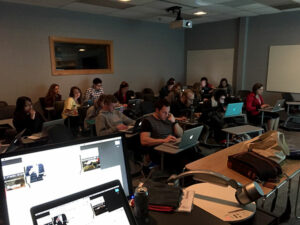Presenting at the Alumni Teaching Scholars Symposium

The first, full report-out of this research will be presented at the Miami University Alumni Teaching Scholars Symposium on April 6, 2015, in Laws Hall located on the Miami University Oxford Campus. All are welcome!
Rewarding Risk Full Abstract

Failing is a key component of the iterative process in design, fueled by the cycle of solution development, outcome assessment, and refinement. This presentation reports research findings from a two-part study that was designed to explore how to encourage learners to risk failure in their coursework so they could gain learning outcomes that transcend the grading scale. This research was operated between November 2014 and March 2015 with learners enrolled in the Graphic Design Major at Miami University. The study was broken into two parts to allow for comparisons between participants’ survey responses and participants’ behavior when given the opportunity to take risks that could produce innovative results.
Part one of the research focused on discovering how design learners define coursework success and how they perceive failure as part of this work. Data gathered using an anonymous survey and responses revealed that a majority of learners were more motivated by growing their knowledge and solving problems instead of achieving high grades. This group indicated they accepted that failure was an important part of the design process. Responses from part one of the research informed the shape of two classroom exercises that were developed to study learners’ behavior when given the opportunity to risk failure in their coursework. The same data points that were asked in part one of the research were re-addressed to learners in part two in order to allow for comparisons between answers and actions. The classroom lesson experiments revealed that most learners self-selected assignment objectives that were more difficult than what the instructor would have selected and that learners recognized that they grew their skills because of the risks they took.

In this presentation, I will detail the research methodology and results, including qualitative and quantitative data collected over the course of the study. Conclusions and next steps will be shared, including recommendations for the development of learning experiences that leave room for learners to take risks in their coursework versus working to achieve only high grades. Based on my findings and research, the potential failures that come from risk-taking are the building blocks for future innovations, self-discovery, and growth. The results of this study revealed that most students were willing to attempt advanced outcomes when learning experiences encouraged risk-taking and where failing was celebrated.
Some Feedback From the Study
Student feedback on risk was sought for the first stage of this research and some fascinating responses were given in reaction to initial survey questions.
The research revealed that “growing skills” was the greatest indicator of success for most students who completed the survey, though the praise of others is still a factor and a helpful tool for evaluating the quality of the work.
I enjoy knowing that I am growing as a designer compared to previous semesters. Also, by learning more and bettering skills I feel that it will help prepare for design outside of a school environment…
…Honestly, it is nice to know people appreciate the work being done and helps give scope as to whether my projects hold value. I definitely have projects that I do just for myself, but it is comforting when other people enjoy the work as well.
a response on how “success” is defined as a design student
Data was also gathered on what it meant for students to take risks in their coursework and what rewards were ideal to encourage risk-taking. One student’s response expressed what they felt like when taking risks, but it also alluded to how instruction may be improved to make the most of risks that were taken to help convert them to opportunities for learning.
The best feeling for me personally after taking a risk happens the night before I turn the project in. It is a great feeling knowing you went for something that could backfire and trying it anyway…
…The real shitty part is when the risk does fall through and you get back a low grade. I think it would be super helpful in situations like that to give constructive feedback on why the risk didn’t pay off and how to make it work in the future.
student feedback on ideal rewards for taking risks
student feedback on ideal rewards for taking risks
Sign Up to Attend the Initial Presentation
The initial presentation of my data and findings will take place on April 6 at 10 a.m. and will be held in Laws Hall at Miami University (room assignments have yet to be made). In order to make sure there is ample room, please sign up at the Center for Teaching Excellence website to attend.